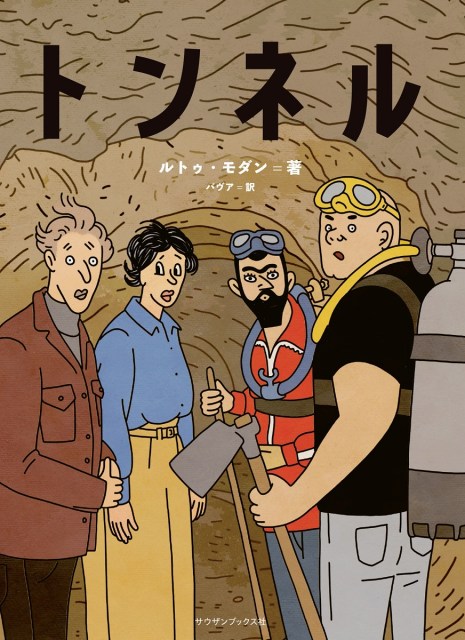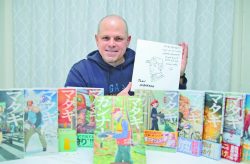- Manga & Anime
- KANTA ON MANGA
Israeli Graphic Novel Tactfully Draws Israel-Palestine Divide; New Japanese Translation Worth Reading at This Moment

by Rutu Modan, translated into Japanese by Bavuah (Thousands of Books, Inc.)

12:00 JST, July 21, 2024
Israel began its offensive in the Palestinian territory of Gaza last autumn. Despite worldwide calls for a ceasefire, neither the Israeli military nor the Islamist organization Hamas, which attacked Israel first, show any signs of backing down. It seems civilians are the ones suffering for this.
“Tunnels” is the latest work by a female Israeli graphic novel artist Rutu Modan. Some may wonder, “Why introduce an Israeli work now, when Israel is being condemned by most of the world?” But “Tunnels” was published in 2020 in Israel and therefore has no direct relationship to the current war. It is only by chance that the Japanese translation is being released this month. But for that reason, I dare say that this work is especially worth reading at this moment.
Nili is an unemployed single mother living in Israel. Nili’s father is an archaeologist and has been searching for the Ark of the Covenant, which contains stone tablets that God is said to have given to Moses. For the Jewish people, it is a legendary treasure that would end their suffering. However, due to the Intifada (a Palestinian uprising against Israeli occupation), tunneling for excavation for relics had to be suspended. Subsequently, Nili’s father begins to suffer from dementia, and his work and social position are stolen by the scheming Professor Rafi. Upset by this, Nili hopes to redeem her father’s honor.
And that opportunity comes. At the site of her father’s excavation, a huge barrier has been erected and is now towering over the site. It seems that the Ark of the Covenant really exists but is in the Palestinian territory. Nevertheless, Nili and her team continue digging their tunnel. Then, to their surprise, they notice that someone else is digging a tunnel from the other side. It turns out to be Mahdi, a Palestinian who had helped Nili’s father with his past excavations. Will these people from two different ethnicities, who run into each other underground, fight for the treasure of the century, or will they join hands?
The Ark of the Covenant is a magical item that also appeared in “Raiders of the Lost Ark,” the first film in the Indiana Jones series. Just reading “Tunnels” is interesting enough, but it would be better to know a bit about the history of Israel and Palestine to appreciate it more fully. A highly recommended book in this respect is “Daremo Shiranai Israel” (The Israel that nobody knows), published by Kadensha. This book, which was written and edited by Bavuah, includes an interview with the author of “Tunnels.”
Bavuah is a two-person unit made up of a male high school teacher with roots in both Japan and Israel and a female Japanese scholar doing research on multi-ethnic societies. Having met through a humanitarian organization for Palestinians, they agreed that they needed to inform others about the complexity of Israeli society, to help solve the Palestinian problem. Translating “Tunnels” was part of this effort.
Indeed, the extent of diversity in Israel, a multi-ethnic nation, is way beyond the imagination of most Japanese. I read “Tunnels” again after reading “Daremo Shiranai Israel,” and it became quite clear to me that this diversity is subtly inserted in many casual scenes. Although the author is an Israeli, one can only admire her excellent sense of balance and sarcastic humor by which she does not favor either side of the divide.
“Tunnels” does not have the sweet ending we might expect. However, it does give hope for the future. It also reminds us that such power is inherent in manga and graphic novels.
Top Articles in Culture
-

Junichi Okada Wears Three Hats in ‘Last Samurai Standing,’ Serving as Star, Producer, Action Choreographer in Thrilling Netflix Period Drama
-

Lifestyle at Kyoto Traditional Machiya Townhouse to Be Showcased in Documentary
-

Maison&Objet Kicks off Near Paris with Japanese Lighting Designers’ Installations on Display, Creating Rich Environment
-

‘Jujutsu Kaisen’ Voice Actor Junya Enoki Discusses Rapid Action Scenes in Season 3, Airing Now
-

Prestigious Japanese Literature Prize Names Toriyama, Hatakeyama as Winners
JN ACCESS RANKING
-

Univ. in Japan, Tokyo-Based Startup to Develop Satellite for Disaster Prevention Measures, Bears
-

JAL, ANA Cancel Flights During 3-day Holiday Weekend due to Blizzard
-

China Confirmed to Be Operating Drilling Vessel Near Japan-China Median Line
-

China Eyes Rare Earth Foothold in Malaysia to Maintain Dominance, Counter Japan, U.S.
-

Japan Institute to Use Domestic Commercial Optical Lattice Clock to Set Japan Standard Time
























